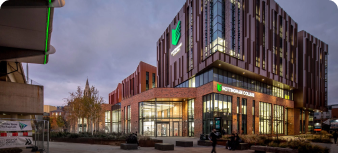
Area Introduction
If you’re passionate about performing arts, you’ll know they are much more than just subjects – they are ways of life!
If you want to pursue a career you love, that makes going to work every day interesting and enjoyable, then choosing a course with us will help you to learn more about the creative industries and how you can find your place within them.
You’ll have access to amazing facilities at our latest campus - the City Hub, including a 200-seater theatre equipped with the latest lighting and sound technology. Plus, we also have dance studios, acting studios, a costume department, a set design studio and a construction workshop!
You’ll also have plenty of opportunity to perform your work throughout the year either in-house, locally, or maybe even internationally.
Many of our shows are watched by industry experts and practitioners looking for the next generation of talent. Next year it could be you treading the boards at the National Theatre, dancing at Notting Hill, or working with visiting industry professionals.
Facilities

Available Courses
BA (Hons) Performing Arts Top-Up Degree (Level 6) - Full-time
Course Area:
Performing Arts
Student Type:
Higher Education
Course Type:
Full-time HE course
Acting (Level 2 UAL Diploma) - Full-time
Course Area:
Performing Arts
Student Type:
16 - 18 courses | Courses for 19+ students
Course Type:
Full-time FE course
Acting (Level 3 UAL Extended Diploma) - Full-time
Course Area:
Performing Arts
Student Type:
16 - 18 courses | Courses for 19+ students
Course Type:
Full-time FE course
Performing Arts (Level 2 UAL Diploma) - Full-time
Course Area:
Performing Arts
Student Type:
16 - 18 courses
Course Type:
Full-time FE course
Dance (Level 3 UAL Extended Diploma) - Full-time
Course Area:
Performing Arts
Student Type:
16 - 18 courses | Courses for 19+ students
Course Type:
Full-time FE course
Performing Arts (Level 1 UAL Diploma) - Full-time
Course Area:
Performing Arts
Student Type:
16 - 18 courses | Courses for 19+ students
Course Type:
Full-time FE course
Careers
Actors, Entertainers and Presenters
Earnings
£27,688
Average Earnings
Employment
Pathways
Art, Performance and Design
Media, Publishing and Information Services
Skills
Speaking
Active Listening
Critical Thinking
Reading Comprehension
Learning Strategies










